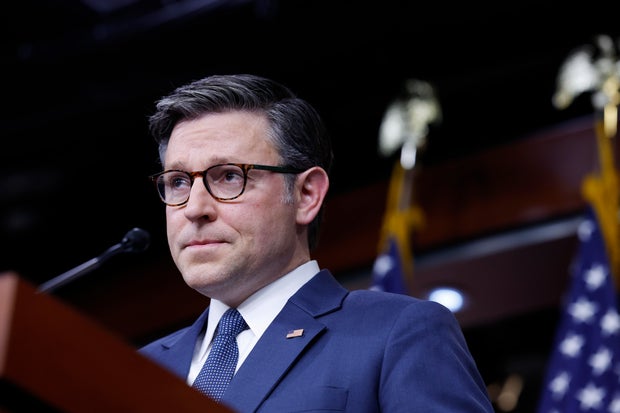Washington — The House of Representatives is expected to vote on a stopgap measure Wednesday to keep the government funded for three months, after Speaker Mike Johnson embraced a clean temporary funding measure that needs Democratic support to pass.
Last week the House rejected Johnson’s first funding plan, which would have funded the government for about six months and involved a noncitizen ballot measure that Democrats saw as a nonstarter. After the setback, which was partly caused by his own party, the speaker said he would opt to hold a vote on a measure to extend financing until December 20 without the voting proposal, rather than risk the government closing weeks before election day.
Johnson was then delivered on Monday a new setback when the stopgap measure failed to gain enough support from the House Rules Committee, forcing House leadership to bring the funding bill to a vote while the rules were suspended. This process requires the support of two-thirds of the chamber to pass.
Johnson said Tuesday he expects the resolution to “pass by a large majority” but made clear he thinks “the best move under the circumstances was the CR with the SAVE Act,” referring to the ballot measure.
“This was our chance to vote both to fund the government and to ensure the security of the election, but we came up just a little bit short,” Johnson said. “So we have to make the last move available.”
The speaker called the legislation a “very limited, bare-bones” temporary measure. And while he noted that “we hate [continuing resolutions] “Like everyone else,” he said, “it would be political misconduct to shut down the government.”
The vote on government funding
Anna Moneymaker/Getty Images
Wednesday’s vote on the funding measure could draw more support from Democrats than Republicans, given conservative opposition to the continuing resolution. The same dynamic has played out in recent funding disputes, putting House Republican leadership in an awkward position with their conference.
House Democratic Leader Pete Aguilar said Tuesday that as Johnson moves to move forward with the vote, he is confident “he has the Republicans to pass the bill,” adding that Democrats “will work together in a bipartisan way to make sure that happens.”
The House will go into a lengthy recess after voting to keep the government funded, and won’t return until after the Nov. 5 elections. And with the three-month funding measure, they’ll face a deadline before the holidays to avoid a shutdown after they return. House Republicans have expressed concern about the outcome, which Congress often falls back on. But Johnson said Tuesday that House leadership opposes an omnibus funding package around the holidays.
“I have no intention of returning to that terrible tradition,” Johnson said, suggesting he would push for the 12 bills to be passed for a full year after the election.
The Senate will also have to act to avert a shutdown before the Oct. 1 deadline, assuming the House bill passes. Senate Majority Leader Chuck Schumer encouraged the House to pass the continuing resolution “swiftly,” saying Tuesday afternoon that “time is of the essence.” He indicated that the Senate will move quickly on the stopgap measure once it is approved by the House to avert the threat of a shutdown.
“If we work together and steer clear of poison pills and partisanship, we can avoid a government shutdown,” Schumer said.








